There were no relatives around Mytro Kotenko when he was buried. His parents did not hear the shots that echoed over his grave. Nor did they hear the sound of the ribbon tied to a wooden cross as the wind rippled.
They also didn’t see the rough dirt that first landed on his coffin and didn’t put a flower on it when it was completely covered by dirt.
SIGHT: 4 reasons why the Ukrainian city of Mariupol is so important to Russia
Kotenko’s parents most likely did not know that their son was being buried that day at the Lychakiv cemetery in Lviv (Lviv in Ukrainian).
They were 600 miles away, with their two youngest children, near the eastern city of Sumy, which was being so heavily shelled by Russian forces that it was cut off from the outside world.
- What is it that moves Putin? Western agents trying to understand what goes through the head of the Russian leader
- What are hypersonic missiles and why their use by Russia in Ukraine “is a signal” from Moscow to the West
- “I looked at the ground and saw my little granddaughter with her head completely smashed”: the heartbreaking stories of the bombing in Mariupol
Kotenko’s parents knew their son was dead. He died on February 26, the third day of the Russian invasion, near the southern city of Kherson. It was his first mission. He was 21 years old.
Two days after his death, his parents received a call from his childhood friend Vadym Yarovenko, an artillery soldier, who broke the news.
It took Yarovenko all night to work up the courage to make the call: a long, restless night in his army bunk in Lviv, only knowing that Kotenko was gone.
They were very young, almost children, when they met at 15 years old, with fresh haircuts and new uniforms for their first day at military school.
When they found out they were from neighboring towns, it was the beginning of a friendship that could have lasted a lifetime.
Country life
Kotenko’s father was a truck driver. Her mother worked on a local farm.
“Joining the army meant moving up in the world,” says Yorovenko. “I think that was part of the reason Dmytro signed up.”
The Kotenkos are a poor family of two parents and three children, with a modest home in a small town on the Russian border in eastern Ukraine, the very people Russian President Vladimir Putin says he is rescuing from the yoke of Ukrainian oppression.
Russia’s annexation of Crimea in 2014, and the harsh war that followed in Donbass in eastern Ukraine, was another reason they signed upYorovenko says.
“We knew that something like this could happen,” he says, “and that we would have to go defend our land.”
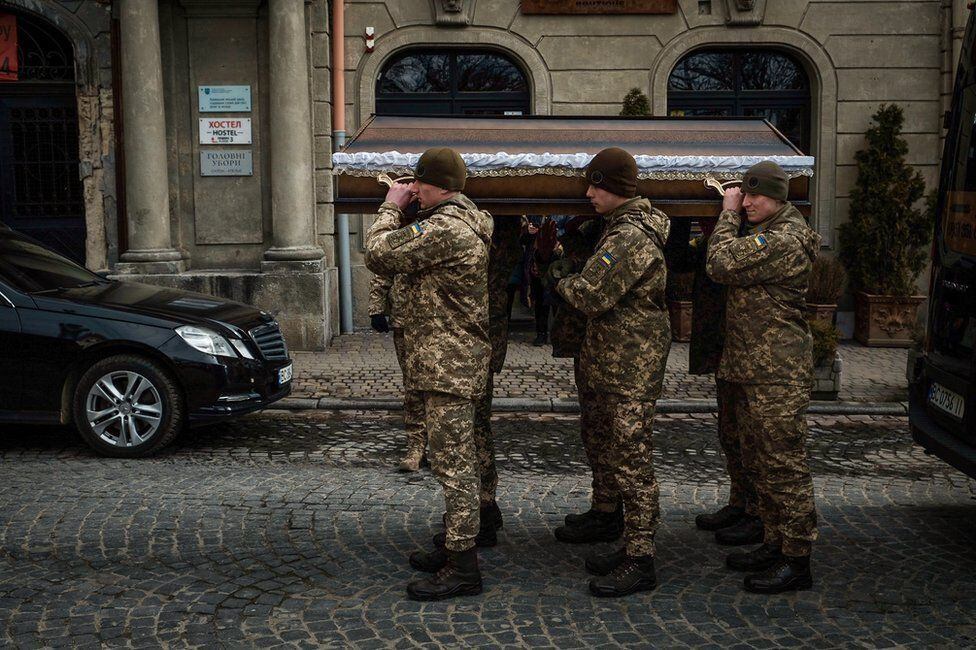
When townspeople asked why they wanted to join the army in wartime, Kotenko would say, “If not me, then who?”
Yarovenko’s father also drives a truck, and at the Sumy military school the youngsters bonded over their love of cars. Yarovenko, an only child, had found something like a brother in Kotenko.
“None of us liked city-style entertainment, clubs, etc,” says Yarovenko. “We loved spending time in nature: fishing, hunting, picnicking. We loved going to the river with friends.”
They worked together on an old car, a red Zhiguli that Kotenko was fixing up on his family land. They fixed the engine and drove it on country roads around the house. They got to know each other’s families.
“Dmytro’s parents loved him and he loved them,” says Yarovenko, wiping tears from his cheeks.
“Dmytro always helped them with repairs, he was good at it. Even when he was at school or at the academy he always helped them. He was very good to his parents. I never heard them argue.”
Yarovenko wanted to join an artillery unit, but Kotenko’s dream was to be a paratrooper. After two years at the academy they were separated: Yarovenko to the western city of Lviv to train in artillery, and Kotenko to the southern city of Odessa to train as a skydiver.
“We text each other every day,” says Yarovenko. “We talked about everything. Regular stuff, ‘How are you? What’s going on where you are?’ We were close friends, just talking.”
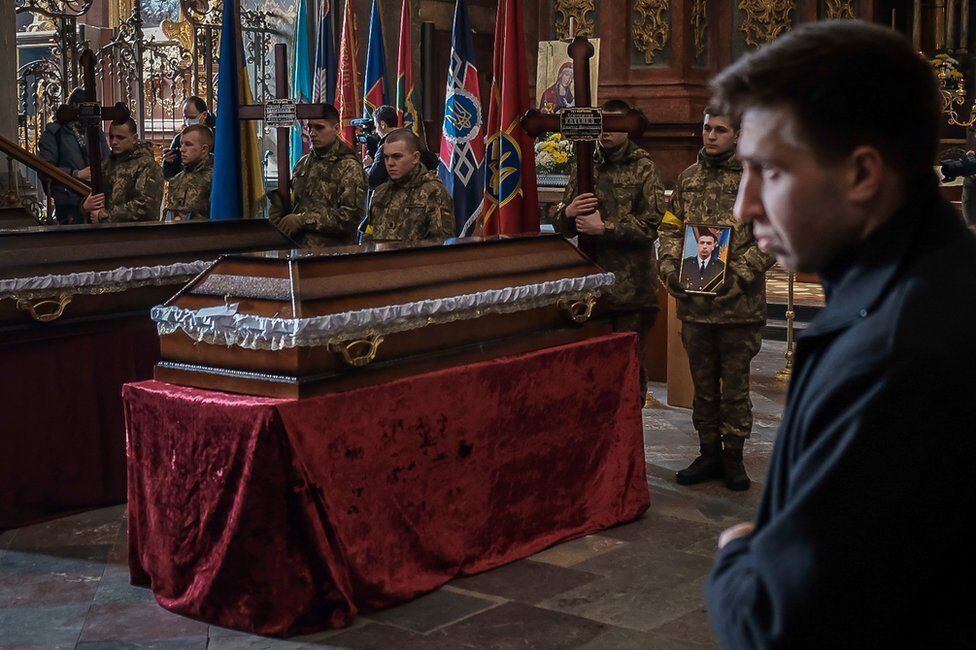
a meeting
For a time last year, from July to October, they met when Kotenko was in Lviv. They went running together on the weekends and worked out together. It was a happy moment.
On December 31, their families gathered to ring in the new year; and about a month later, Kotenko arrived in Lviv to visit Yarovenko before deploying to the south on an operation.
They stayed up late, drinking a little and talking.
Along Ukraine’s borders, Russian forces were already concentrated, awaiting orders to invade. But in Lviv, life was normal; and tonight, war seemed a long way off.
The next morning, Kotenko and Yarovenko said their goodbyes, and Kotenko headed south. They continued to send each other messages every day. On February 26, Kotenko stopped responding and Yarovenko feared the worst.
Finally, he got on the phone with the commander of Kotenko’s unit, who told him that his friend died from a mortar shell.
“I don’t have all the details yet,” says Yarovenko. “There was shelling, there was an explosion and Dmytro was killed.”
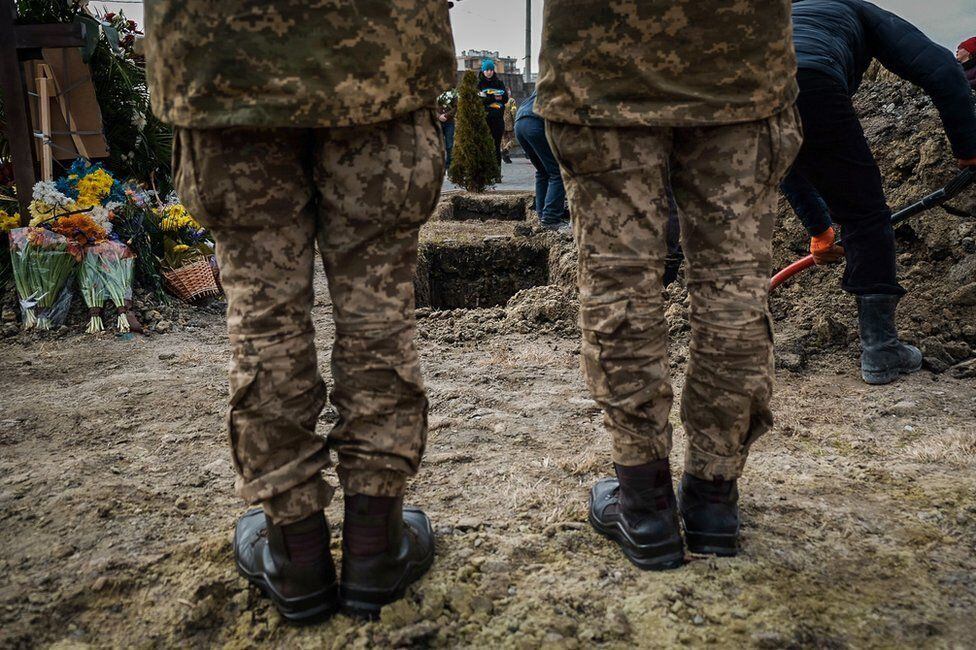
“We pray every day for those who died in the war”
When he dialed the number for Kotenko’s parents there was still a phone connection and, in a brief conversation, he told them that their son had died.
When he tried to call later to discuss the funeral, the aerial bombardment of Sumy had gotten worse and the line was dead. He kept trying, but the line remained dead.
So Kotenko’s body was taken to Lviv and buried there without them, because the city was safe from shells.
Yarovenko traveled alone from his base to the Garrison Church of Saints Peter and Paul, standing alone on one side of the nave, under its vaulted ceiling painted with saints, as smoke from burning incense wafted over priests and mourners. .
Beside him were boards mounted with photographs of those killed in the Ukraine war.
The first images were placed by chaplains in 2014, to honor fallen soldiers who had been members of the church.
Then grieving parents from all over Lviv saw the pictures and wanted their sons and daughters to be there; and gradually the collection of portraits grew.
“They bring us pictures because they know we pray every day for those who died in the war,” says Father Vsevolod, one of the chaplains.
“We are part of this city’s mission to bury the men and women of the military with honors, so their acts of bravery are never forgotten.”
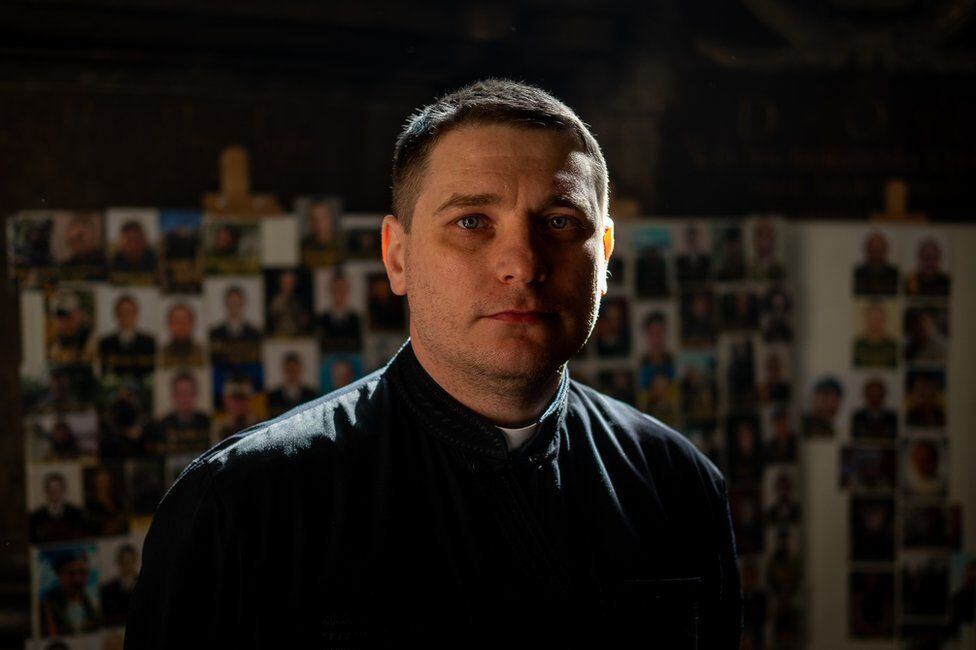
Before the invasion, the church held a funeral for a soldier once or twice a month, Father Vsevolod says. Now he buries two or three men a day.
None of the recent dead have been added to the portrait wall yet. Kotenko is not there, but the photo of him will go up, says Vsevolod.
And if a family was isolated and did not know that their child was being buried in Lviv, the church will add them for them.
The burial
On the day of Kotenko’s funeral there were three coffins in the church. One of the men was from a village near Lviv, the church was filled with his family and friends and then he was taken home.
The other two coffins were moved quietly to the Lychakiv cemetery, with a small group of soldiers from a local unit helping to commemorate the dead.
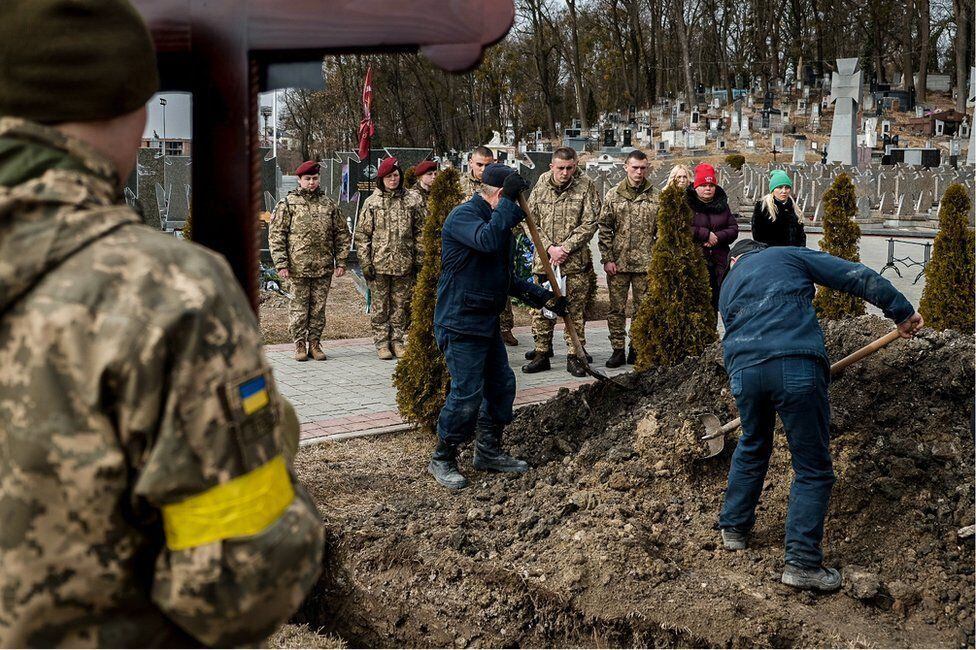
Kotenko was buried next to 25-year-old Kyrylo Moroz Volodymyrovych, a paratrooper from his unit who also could not be taken home.
They were buried in a far corner of the cemetery, among the dead of the First and Second World Wars and the war against the Russian-backed forces in the Donbas.
Kotenko and Volodymyrobych were the fourth and fifth men killed in this invasion to be buried in Lychakiv. Their graves were nearly bare except for a bouquet of roses and a bouquet of asters placed by the church and marked with their unit designation.
The other three graves, for soldiers from Lviv, were adorned with flowers and lanterns.
The next day, Lychakiv gravediggers buried two more men. The day after, three.
Eventually, the wooden crosses that bore their names will be replaced by tombstones that will keep their memory here forever.
“Thank God, we still don’t have fighting here in Lviv,” says the gardener, “so we can bury the soldiers defending our home.”
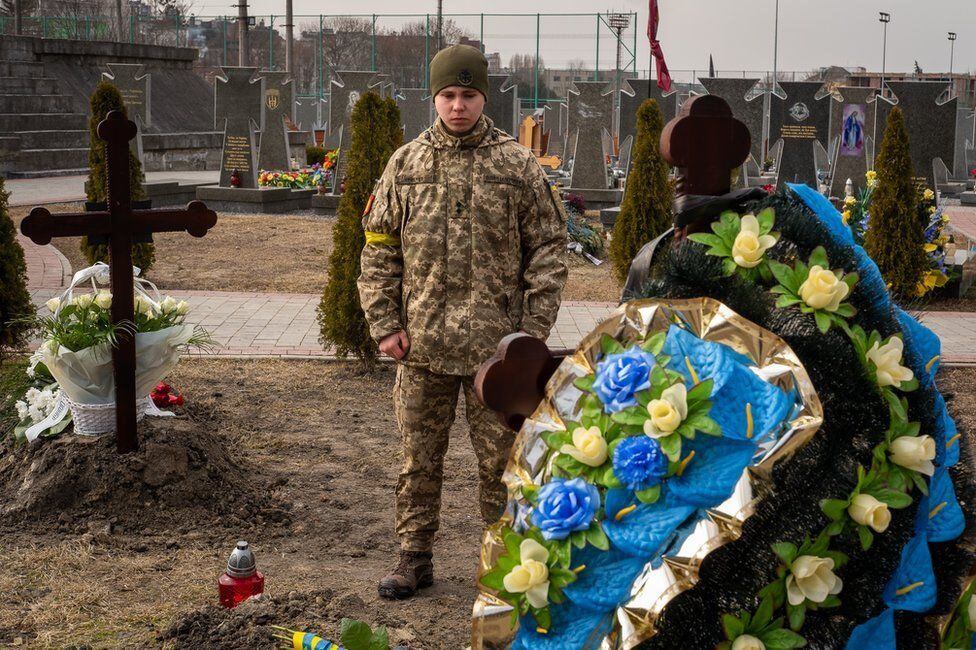
Yarovenko is still trying to reach Kotenko’s parents, but the line is dead. They are probably still stuck in Sumy.
The invasion has stolen first their son, and then one of the few things that could have eased their pain: the right to be by his side when he was buried.
As Kotenko’s coffin was lowered, Yarovenko stepped aside, behind the honor guard firing their guns. It was the saddest thing he had ever experienced.
“I saw how my friend was buried far from his house,” he says. Afterward, she was silent, looking at the grave, the only mourner left, alone with the gravediggers as they removed their tools.
“We never had the opportunity to meet on the front lines,” he says.
All that remained was the hope of speaking to Kotenko’s parents soon; and the memory of the boy, which he will carry with him while he awaits his turn to fight.
And he’ll take it to the front when he leaves.
With information from Svitlana Libet.
______________________________
- Putin says Western sanctions are like a ‘declaration of war’
- Ukraine shows on social networks the missile attack on a helicopter: “This is how the Russian occupiers die!” | VIDEO
- Visa and Mastercard suspend operations in Russia due to the invasion of Ukraine
- The strange act of Vladimir Putin between jokes, flowers and stewardesses in full offensive in Ukraine
- British journalists recorded the moment they were fired upon by Russian troops in Ukraine
- War correspondent in Ukraine: “No one imagined that this would happen with such brutality”
Source: Elcomercio

:quality(75)/cloudfront-us-east-1.images.arcpublishing.com/elcomercio/GE4DCMJNGAZS2MRTKQYDAORRHA.jpg)



:quality(75)/cloudfront-us-east-1.images.arcpublishing.com/elcomercio/MYDUN2RCS5E6XNXC34C3LXGSKU.jpg)

